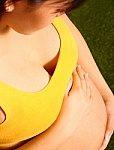Morning sickness
What is morning sickness?
- Eat small frequent meals. Avoid skipping meals as an empty stomach cause precipitate your morning sickness.
- Drink small amounts of fluid throughout the day to keep you hydrated
- Avoid spicy, oily and greasy food
- Identify triggers. For some women it is a certain scent or even cooking. Avoid humid or stuffy places as it could trigger nausea.
- Eat dry crackers as soon as you wake up
- Some women find that their prenatal vitamins containing iron may make their morning sickness worse. If this is so, you could try taking your vitamin later on in the day with meals or just before you go to bed. If you do stop taking you prenatal vitamins, do at least take the folic acid vitamin.
- Try changing your toothpaste brand with a more bland tasting one if you tend to be nauseated early in the morning.
- Vitamin B6 (10 – 25mg) three times / day. This could help reduce your nausea but not vomitting.
- Antihistamine / anti-nausea medications such as metoclopromide. This could help reduce nausea and vomitting. It could either be taken in the tablet or injected form.
- Acupuncture and acupressure. Studies have not shown that these acupressure wristbands are more effective than sham (fake) wristbands.1However, some women may find it helpful. Acupuncture and acupressure have no known harmful side effects.
- Hypnosis. This may be helpful in some women.
- Ginger. Powdered ginger have been shown to be helpful in alleviating morning sickness in some women. However, more studies need to be done to ensure it is safe and effective. If you want, you could try taking ginger lollipops or ales to help reduce your nausea and vomitting.
- If you feel excessively thirsty and tired
- Unable to tolerate any fluid causing severe dehydration
- Excessive vomiting
- If you see blood in your vomit.
- Lower abdominal pain and cramping
RECOMMENDED PRODUCTS:
[easyazon-image align=”none” asin=”0923521828″ locale=”us” height=”160″ src=”http://ecx.images-amazon.com/images/I/51F0O8CSwdL._SL160_.jpg” width=”106″] [easyazon-image align=”none” asin=”B000XP9DSW” locale=”us” height=”160″ src=”http://ecx.images-amazon.com/images/I/211KPacgo6L._SL160_.jpg” width=”160″] [easyazon-image align=”none” asin=”1419640933″ locale=”us” height=”160″ src=”http://ecx.images-amazon.com/images/I/51ySwg2rZzL._SL160_.jpg” width=”105″] [easyazon-image align=”none” asin=”B001MK8FHC” locale=”us” height=”160″ src=”http://ecx.images-amazon.com/images/I/51JX-hijKKL._SL160_.jpg” width=”109″] [easyazon-image align=”none” asin=”B00820HS1E” locale=”us” height=”160″ src=”http://ecx.images-amazon.com/images/I/31gFK1plI7L._SL160_.jpg” width=”160″]
REFERENCES:
1. Jewell D, Young G. Interventions for Nausea and vomitting in pregnancy. Cochrane Database Syst Rev 2003; (4): CD000145.








